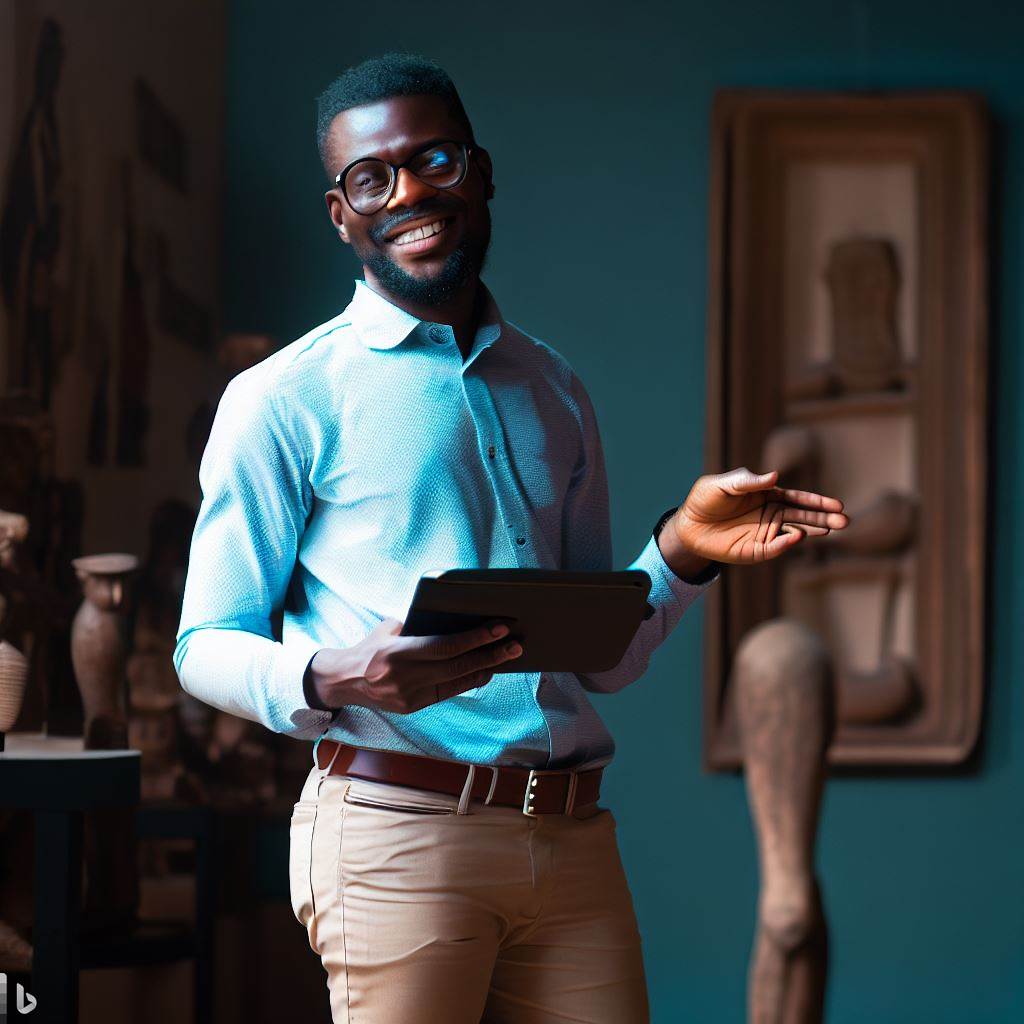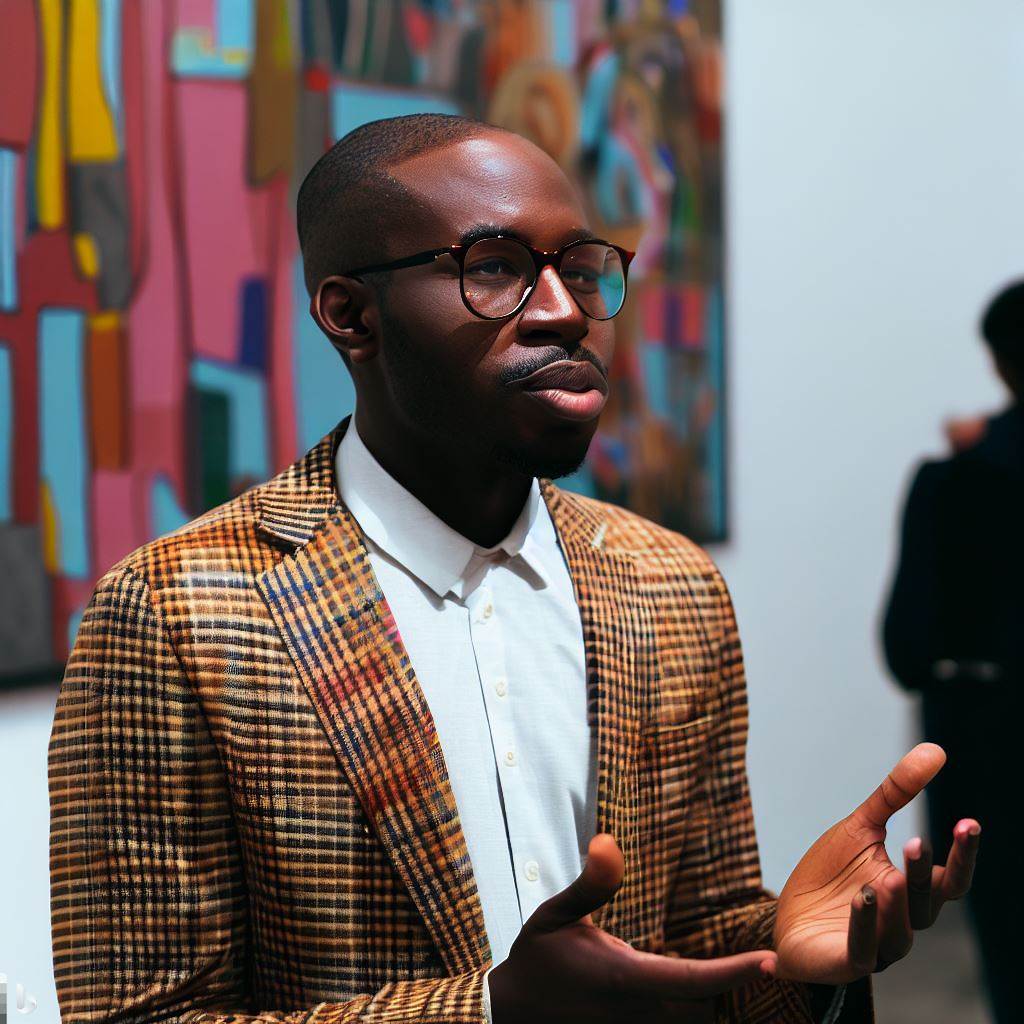Introduction
Definition of a museum curator
Museum curator is a professional responsible for managing and preserving collections of artifacts, artworks, and historical objects.
Overview of the importance of museum curators in preserving and promoting Nigerian cultural heritage
Museum curators play a crucial role in safeguarding and promoting Nigerian cultural heritage by ensuring its preservation and interpretation.
The steps involved in becoming a museum curator in Nigeria
The journey to becoming a museum curator in Nigeria involves several steps, including education, gaining relevant experience, and networking within the field.
A museum curator, a vital guardian of cultural treasures, meticulously manages collections, interprets history, and ensures preservation.
The Significance of Museum Curators
- Preservation: Curators safeguard artifacts from time’s erosion, preserving Nigeria’s rich heritage for future generations.
- Education: They educate the public about Nigeria’s diverse culture, fostering national pride and understanding.
- Research: Curators engage in scholarly research, unearthing hidden narratives within historical relics.
- Exhibitions: They curate captivating exhibitions, telling compelling stories through carefully selected artifacts.
- Cultural Exchange: Curators facilitate international collaborations, showcasing Nigeria’s heritage on a global stage.
Steps to Becoming a Museum Curator in Nigeria
- Education: Obtain a bachelor’s degree in relevant fields like history, archaeology, or museum studies.
- Gain Experience: Intern or volunteer at museums to build practical skills and network.
- Advanced Degree: Pursue a master’s or Ph.D. in museum studies or a related discipline.
- Specialization: Develop expertise in a specific area, such as African art or archaeology.
- Networking: Attend conferences, join professional organizations, and connect with experienced curators.
- Apply: Seek curator positions in Nigerian museums, galleries, or cultural institutions.
- Continued Learning: Stay updated with industry trends and technologies through workshops and courses.
- Publish and Present: Share your research findings and insights through publications and presentations.
- Commitment: Display dedication to preserving and promoting Nigeria’s cultural heritage.
- Ethics: Adhere to ethical guidelines, respecting cultural sensitivity and ownership rights.
By understanding the role, significance, and steps to become a museum curator in Nigeria, you embark on a journey to preserve and celebrate the nation’s rich cultural tapestry.
Step 1: Education and Qualifications
Education Background for Aspiring Museum Curators in Nigeria
- Obtain a Bachelor’s degree in a relevant field such as History, Art History, Anthropology, or Archaeology.
- Some institutions offer specialized programs in Museum Studies or Curatorial Studies.
- A strong educational foundation in Nigerian history and culture is essential.
Relevant Degree Programs and Areas of Study
- Bachelor’s degree programs in History: Provide a comprehensive understanding of historical contexts.
- Bachelor’s degree programs in Art History: Focus on the study of artistic movements and styles.
- Bachelor’s degree programs in Anthropology: Offer insights into diverse cultures and their artifacts.
- Bachelor’s degree programs in Archaeology: Concentrate on the study of ancient civilizations and artifacts.
- Specialized programs in Museum Studies or Curatorial Studies: Provide specific training in museum practices.
Obtaining Practical Experience through Internships or Volunteering Opportunities
- Seek internships at museums, galleries, or cultural heritage organizations in Nigeria.
- Volunteering at local museums or heritage sites allows for hands-on experience in curatorial work.
- Participate in archaeological digs or research projects to gain practical knowledge.
- Networking with professionals in the field can lead to additional internship or volunteering opportunities.
Building a Strong Knowledge Base
The significance of understanding Nigerian history, art, and culture
- Understanding Nigerian history is fundamental for aspiring museum curators in Nigeria.
- Knowledge of Nigerian art and culture enhances the curator’s ability to showcase exhibits.
- Gaining insight into the country’s historical context allows curators to provide accurate interpretation.
- A deep understanding of Nigerian history, art, and culture forms the foundation of effective curation.
- Museum curators in Nigeria must possess comprehensive knowledge about their cultural heritage.
The resources available for researching and gaining knowledge, such as libraries, archives, and online databases
- Libraries play a vital role in providing access to a wide range of educational resources.
- Archives offer primary sources that enable curators to gather authentic information.
- Online databases provide convenient access to an extensive collection of research materials.
- Museum curators should utilize libraries, archives, and online databases for in-depth research.
- Relying on various resources ensures curators have a well-rounded knowledge base.
Attending workshops, seminars, and conferences related to museum studies or Nigerian cultural heritage
- Attending workshops allows curators to learn from industry professionals and gain practical skills.
- Seminars provide a platform for curators to discuss current trends and share experiences.
- Conferences offer opportunities to network with experts and stay updated with the field.
- Museum curators should actively participate in workshops, seminars, and conferences.
- Continuous learning through attending events ensures curators stay relevant in their profession.
Developing Relevant Skills
key skills required for museum curators, such as organization, attention to detail, research, and communication skills
As a museum curator in Nigeria, there are several key skills that you need to develop in order to excel in your role.
These skills are essential for effectively managing and curating the collections within the museum.
First and foremost, organization skills are crucial. A museum curator should be able to keep track of various artifacts, documents, and artworks, ensuring that everything is cataloged and stored properly.
Attention to detail is also important, as curators need to carefully examine artifacts for preservation purposes.
In addition, research skills are essential for museum curators. They must be able to conduct extensive research on the history and significance of the items in their collections.
This includes researching the cultural and historical contexts surrounding the artifacts.
Finally, communication skills are vital for museum curators. They need to effectively communicate with other staff members, researchers, and visitors to the museum.
Curators often give presentations or lectures, so being able to convey complex information in a clear and engaging manner is crucial.
The importance of acquiring practical skills in areas like collections management, conservation, exhibition design, and curation
Acquiring practical skills in various areas is vital for museum curators. For instance, collections management skills are necessary for properly caring for artifacts and ensuring their preservation.
This includes understanding techniques for handling, storing, and displaying different types of objects.
Conservation skills are also crucial in preserving the integrity of the artifacts. Curators must have knowledge of conservation methods, such as proper cleaning techniques and the use of appropriate materials.
Exhibition design skills are essential for curators to create engaging and informative displays.
They need to think about how to showcase artifacts in a visually appealing way that effectively communicates their significance to visitors.
Moreover, curating skills are fundamental to the work of a museum curator.
Curators must have a deep understanding of their collections and be able to curate exhibits that tell compelling stories and engage the audience.
Opportunities for skill development, including workshops, training programs, and professional development courses
Fortunately, there are numerous opportunities for skill development for aspiring museum curators in Nigeria.
Various workshops and training programs are available that focus on different aspects of museum management and curation.
These workshops often provide hands-on experiences and practical training in collections management, conservation techniques, exhibition design, and curatorial practices.
They allow curators to learn from experienced professionals in the field and gain valuable insights into best practices.
In addition to workshops, there are also professional development courses offered by institutions and organizations.
These courses cover a wide range of topics, from museum administration to art history, and provide a comprehensive education for aspiring curators.
Furthermore, networking and attending conferences or seminars can also be valuable for skill development.
These events allow curators to connect with their peers, learn from experts, and stay updated on the latest developments in the museum field.
In conclusion, developing relevant skills is a crucial step in becoming a successful museum curator in Nigeria.
By acquiring skills in organization, attention to detail, research, and communication, curators can effectively manage collections and curate engaging exhibits.
Various opportunities, such as workshops, training programs, and professional development courses, exist to further develop these skills and enhance one’s expertise in the field of museum curation.
Read: Nigeria’s Curator Job Market: Trends and Opportunities
Step 4: Networking and Building Connections
The importance of networking within the Nigerian museum community
Networking is a crucial aspect of becoming a museum curator in Nigeria.
It allows individuals to establish connections within the Nigerian museum community, which can open doors to numerous opportunities and career growth.
Building a strong network within the industry enhances one’s visibility and credibility.
It provides access to valuable resources, information, and mentorship from experienced professionals.
Networking also helps curators stay updated on emerging trends, technologies, and best practices.
As a museum curator, attending industry events like conferences, workshops, and seminars is an excellent way to meet and connect with fellow professionals.
These events provide opportunities to learn from experts in the field and engage in meaningful conversations.
Ways to build connections, such as attending museum events, joining professional organizations, and engaging with fellow curators
Building connections in the Nigerian museum community can be achieved through various means.
Attending museum events is a great way to meet like-minded individuals and establish relationships with professionals in the field.
Professional organizations, such as the Nigerian Museums Association (NMA), offer platforms for networking.
Joining these organizations not only allows curators to connect with peers but also provides access to conferences, workshops, and other educational opportunities.
To build connections, curators can also engage with fellow museum curators through online platforms and social media groups.
Participating in discussions and sharing experiences can create valuable connections and foster collaborations.
The advantages of networking for future job opportunities and collaborations
Networking plays a vital role in creating future job opportunities and collaborations for museum curators in Nigeria.
By connecting with professionals in the field, curators can stay informed about job openings, internships, and fellowships within the industry.
Personal connections often lead to referrals, which can give curators a competitive edge during the hiring process.
Recommendations from trusted professionals carry weight and demonstrate that the curator is well-regarded within the community.
Networking also facilitates collaborations among curators, museums, and cultural institutions.
Through these collaborations, curators can exchange knowledge, resources, and exhibit ideas.
Collaborative projects showcase teamwork and creativity, enhancing the curator’s professional reputation.
Networking is an essential step for individuals aspiring to become museum curators in Nigeria.
Attending events, joining professional organizations, and engaging with fellow curators in the Nigerian museum community creates opportunities for jobs and collaborations.
By actively networking, curators can enhance their visibility, credibility, and continuous growth within the field.
Read: Digital Curation in Nigeria: A Modern Take on Tradition
Step 5: Gaining Professional Experience
Explore avenues for gaining hands-on experience in the museum field, such as internships, assistantships, or entry-level positions
- Internships: Begin by seeking internships at local museums to learn practical skills in curating.
- Assistantships: Assistant roles offer valuable experience working closely with experienced curators.
- Entry-Level Positions: Consider entry-level positions that provide exposure to different aspects of museum curation.
- Networking: Connect with professionals in the field through networking events, conferences, and online platforms.
- Volunteer: Offer your time as a volunteer to gain hands-on experience and expand your network.
- Education: Pursue relevant courses or degrees in museum studies or art history to enhance your qualifications.
- Independent Projects: Curate your own exhibitions or projects to showcase your skills and creativity.
- Mentorship: Seek mentorship from established curators for guidance and insights.
- Continuous Learning: Stay updated with the latest trends and technologies in the museum field.
- Persistence: Keep applying and learning, as persistence can lead to rewarding curator positions in the future.
Benefits of practical experience in building credibility and developing a strong portfolio
- Provides valuable real-world experience in handling museum artifacts and exhibitions.
- Allows opportunities to work alongside experienced professionals and learn from their expertise.
- Enhances understanding of museum operations, including conservation, exhibition planning, and curatorial research.
- Develops essential skills in cataloging, research, curating, and handling delicate objects.
- Builds credibility and establishes a track record within the museum community.
- Provides networking opportunities and connections with influential professionals in the field.
- Offers a chance to prove oneself and gain recommendations for future career advancement.
- Helps in assessing personal aptitude and interest in pursuing a long-term career as a museum curator.
Tips for finding and applying for relevant opportunities
- Research various museums in Nigeria and identify those offering internship or assistantship programs.
- Utilize online platforms, museum association websites, and social media channels to search for openings.
- Attend museum job fairs, conferences, and workshops to network and learn about potential opportunities.
- Prepare a well-crafted resume, highlighting relevant skills, education, and any previous museum-related experiences.
- Write a compelling cover letter expressing enthusiasm for the specific institution and position.
- Follow instructions carefully when submitting applications and ensure all requested documents are included.
- Prepare for interviews by researching the museum’s collection, mission, and current exhibitions.
- Show genuine passion for the museum field and willingness to learn and contribute to the organization.
- Consider volunteering or freelancing as a way to gain initial experience and make valuable contacts.
By actively seeking out opportunities to gain professional experience in the museum field, aspiring curators can enhance their knowledge, skills, and credibility within the industry.
Practical experience not only provides hands-on learning but also lays the foundation for a strong portfolio and invaluable networking connections.
With dedication, perseverance, and a proactive approach, becoming a museum curator in Nigeria is an achievable goal.
Read: Skills Needed to Thrive as a Curator in Nigeria

Step 6 Applying for Museum Curator Positions
Crafting a Compelling Resume and Cover Letter
- Highlight relevant experience, skills, and educational background in your resume and cover letter.
- Customize your application materials to fit the specific requirements of museum curator roles.
- Use clear and concise language, and ensure your resume and cover letter are error-free.
- Emphasize your passion for the field and your unique qualifications.
- Showcase any previous experience in research, curation, or museum-related work.
Showcasing Relevant Experience, Skills, and Educational Background
- Include a detailed section on your resume highlighting your relevant experience in museums or cultural institutions.
- List specific skills such as knowledge of art history, preservation techniques, and exhibition design.
- Highlight any educational background or degrees related to museum studies or curatorial practices.
- Mention any additional qualifications, such as language proficiency or grant writing experience.
- Link your experience and skills to the specific requirements and responsibilities outlined in the job description.
Tips for preparing and presenting for Curatorial Interviews
- Research the museum and its current exhibitions to familiarize yourself with their collections.
- Prepare thoughtful questions to ask the interviewer, demonstrating your interest and knowledge.
- Practice answering common interview questions, emphasizing your skills and experience.
- Prepare examples of successful projects or exhibitions you have curated in the past.
- Discuss how you would contribute to the museum’s mission, vision, and long-term plans.
- Show enthusiasm, confidence, and a deep understanding of the curatorial field.
By following these steps, you can increase your chances of securing a museum curator position in Nigeria.
Craft a compelling resume and cover letter tailored to museum curator roles, highlighting your relevant experience, skills, and educational background.
Prepare for curatorial interviews by researching the museum, practicing common interview questions, and showcasing your passion and suitability for the position.
Good luck on your journey to becoming a museum curator in Nigeria!
Read: Challenges Faced by Curators in Nigeria’s Museums
Discover More: Hair Stylist Tools: Must-Haves in Nigeria’s Salons
Step 7 Continuing Professional Development
The need for continuous learning and growth in the museum curator profession
- Curators must actively seek opportunities to expand their knowledge and skills.
- Continuous learning ensures that curators stay relevant in an ever-evolving field.
- By pursuing professional development, curators can enhance their expertise and advance their careers.
The importance of staying updated with industry trends, technological advancements, and new research in the field.
- Curators should stay informed about emerging trends and shifts in museum practices.
- Technological advancements greatly impact how curators engage with audiences and showcase exhibits.
- Staying up-to-date enables curators to incorporate innovative ideas into their work.
- New research in the field provides valuable insights and enables curators to present accurate and relevant information.
Resources for ongoing professional development, such as conferences, workshops, online courses, and publications.
- Attending conferences allows curators to network and learn from industry experts.
- Workshops provide hands-on training and opportunities for skill development.
- Online courses offer flexibility and accessibility for curators to engage in learning at their own pace.
- Publications, including books and academic journals, disseminate research and scholarly discussions in the field.
Continuous professional development is crucial for museum curators to thrive in their careers and contribute to the field’s growth and advancement.
As the museum landscape evolves, curators must actively seek learning opportunities to remain at the forefront of their profession.
By embracing continuous learning and growth, curators demonstrate their commitment to delivering educational and engaging experiences for museum visitors.
They also showcase their adaptability and willingness to incorporate new ideas and technologies into their practices.
The importance of staying updated with industry trends cannot be understated.
By keeping a finger on the pulse of the field, curators can anticipate shifts in visitor preferences and expectations.
This knowledge enables them to develop relevant and captivating exhibitions, ensuring continued public interest in museums.
Technological advancements are transforming the way museums operate. Curators must familiarize themselves with digital tools, interactive exhibits, and virtual reality experiences.
This knowledge allows them to create immersive and interactive displays that appeal to diverse audiences.
To support ongoing professional development, numerous resources are available to museum curators.
Conferences offer a platform for curators to attend presentations, participate in workshops, and engage in meaningful discussions with peers.
Workshops provide hands-on training and allow curators to expand their skills in specific areas.
Topics range from conservation techniques to exhibition design and educational programming.
Online courses are a convenient way for curators to access learning materials and gain new knowledge in a flexible format.
Conclusion
The key steps involved in becoming a museum curator in Nigeria
To become a museum curator in Nigeria, follow these key steps: education, knowledge, skills, networking, professional experience, and continuous development.
Importance of education, knowledge, skills, networking, professional experience, and continuous development
Education, knowledge, skills, networking, professional experience, and continuous development are essential for success as a museum curator in Nigeria.
Preserving Nigerian cultural heritage as future museum curators
Pursue your passion for preserving Nigerian cultural heritage and become a future museum curator, contributing to the nation’s rich history.
- ducation: Begin with a relevant bachelor’s degree.
- Knowledge: Specialize in areas like history, archaeology, or museum studies.
- Skills: Develop research, curation, and communication skills.
- Networking: Connect with industry professionals and join associations.
- Experience: Gain hands-on experience through internships and volunteering.
- Advanced Study: Pursue a master’s or Ph.D. in museum-related fields.
- Apply: Seek curator roles in Nigerian cultural institutions.
- Growth: Continuously learn, attend workshops, and publish research.
- Passion: Let your love for Nigerian heritage drive your dedication.
Reiterating Importance:
Publish Your Professional Profile, Business or Brand
Showcase your expertise, gain trust, and boost visibility instantly on Professions.ng.
Publish NowEducation, knowledge, skills, networking, experience, and ongoing growth are the keys to unlocking your curator journey.
Your passion for preserving Nigerian culture will be your guiding light. Join the ranks of those who safeguard our heritage for generations to come.




